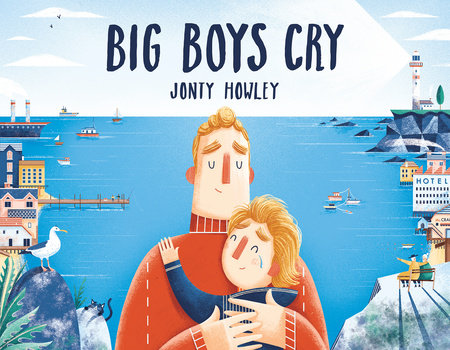Big Boys Cry:
Teaching Children That Tears Are Nothing to Fear
by Jonty Howley
Last month, I went to see a live performance of original scores from some of my favorite animated films. One of the features has an infamously heart-wrenching introduction (I’ll let you guess which one it was!), and while watching the scene unfold on the big screen, bolstered by the beautiful swell of the live orchestra, I was soon reduced to a bit of a state.
Despite being surrounded by strangers, it didn’t worry me one bit. In knowing they were likeminded fans of the film, my enjoyment of the evening was made all the more complete by feeling able to embrace the emotion in a way that was honest and authentic, without fear of judgment.
This is a great scaled-down illustration of the thinking behind Big Boys Cry. Emotional literacy is a big conversation today, and rightly so. But when it comes to those discussions, a lot of people get caught up on the idea of “strength” — whether they feel it takes more strength to hide your emotions, or to be open with how you feel.
For my part, I think the important thing is that everyone has a safe place to share how they’re feeling and to work through those feelings with people they trust. I believe real strength is built by being able to experience and express the full range of emotions, whether you’re scared by a new challenge, moved by a piece of music, or simply happy to be home.
In Big Boys Cry, I wanted to gently approach the subject and let the narrative do the talking. Rather than feeling heavy or foreboding, I want this to be a positive theme to explore and discuss.
As the book opens, you join Levi as he makes his way to his first day at school. He’s feeling afraid, so before he sets off, his Papa tells him “Big boys don’t cry,” which Levi takes to heart. Thankfully, along the way, Levi encounters a number of traditionally “strong-looking” men and women openly displaying a range of emotions, and by the time he gets home, his learned perception that tears equate to weakness has been dispelled. He finds his Papa, finally being honest with his own emotions, and they are made all the closer by it.
My hope for Big Boys Cry is that by presenting a fun, colorful world where healthy expression of emotion has no negative stigma, readers will see that the characters are in no way weakened by their feelings, but rather strengthened and enriched by them. Their ability to be open and vulnerable with one another allows for greater joys and closer relationships.
I hope readers both young and old enjoy meeting Levi and Papa, exploring their vibrant seaside town filled with biker-cats, passionate poets, and sneaky seagulls, and learning that tears are just another part of life — and nothing to fear.

